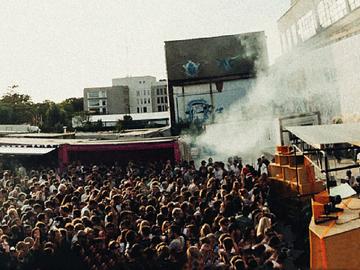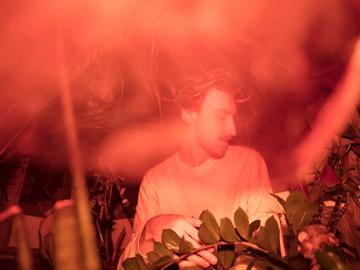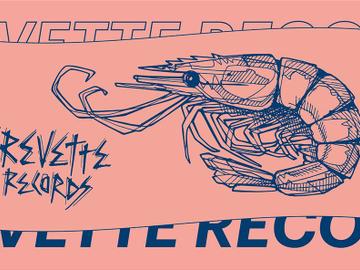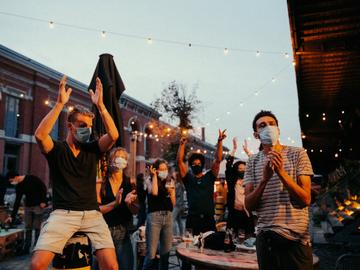BRUZZ has brought together both the substructure and superstructure of Brussels’s nightlife: Pim Thomas and Dirk De Ruyck. The former is building a success story with his record shop in the heart of the Marolles, while the latter’s festival is approaching a pivotal turning point. “Things will explode soon, and it will set us off for years.”
© Ivan Put
| The young rogue and the pioneer: Pim Thomas (on the left) and Dirk De Ruyck cross-fertilizing at the Crevette Records shop.
Also read: Hang-out at Crevette Records
There are a few generations between Pim Thomas (25) and Dirk De Ruyck (50), but in terms of enthusiasm the older organizer of the Listen! Festival is every bit a match for the younger manager of Crevette Records. “Without people like Pim we would be nowhere,” he is very conscious of the need for young rogues who keep their finger on the pulse. “We do things from an organizational perspective with the most important players in Brussels’s nightlife, but he symbolizes the culture for which we seek to provide a platform.” De Ruyck tells us that he is no longer so well informed about all the latest releases, but that his tons of experience in A&R jobs and as a programmer amply compensate. The urban festival Fire Is Gold in Vilvoorde, Laundry Day in Antwerp, and the electro festival WECANDANCE in Zeebrugge continue to call on his expertise.
Nevertheless, De Ruyck will be best-remembered by most people for putting Ghent’s nightlife on the international map with his Eskimo, Belmondo, and Culture Club parties. Compared to all this, Pim Thomas is still a real whippersnapper. He only opened his vinyl speciality store on Blaesstraat/rue Blaes a year and a half ago. It immediately became the favourite hang-out for DJs and music lovers with an open mind. Promoting cross-fertilizations between genres and visitors is likewise one of the ambitions of the Listen! Festival. It has put its ambient room in Flagey at the disposal of Crevette Records, which has since also become a label. Thomas, aka DJ Alfred Anders, gets to play the eclectic records that he also tries to sell to his clientele.
Dirk, how did a pioneer of Ghent’s nightlife end up in Brussels?
Dirk De Ruyck: I lived in Ghent until I was forty. I then followed my wife to Meise and visited Brussels much more often. It was quite an adjustment because I had to deal with the language barrier. If, as a Fleming, you get stuck on the Vlaamsesteenweg/rue de Flandre and at the Beursschouwburg, it doesn’t work. Collaborating with French-speakers opened my eyes and I fell in love with the city that many people back in Ghent still think of as a hell hole.
Over time we want to challenge the generally held idea that the Fuse is techno and De Munt/La Monnaie is classical.
You wanted to unite the local scene by organizing a festival that also had the ambition of becoming an international hit?
De Ruyck: That’s right. Brussels has a bizarre reputation abroad, even though it is the centre of Europe. By train, you can be in Paris in an hour, in Amsterdam in an hour and a half, and in London in two and a half hours. And yet not enough people have the spontaneous impulse to come to Brussels for the weekend. The Amsterdam Dance Event, which is an economic goldmine with almost half a million visitors, is clear proof that it doesn’t have to be this way. We wanted to put things in motion in Brussels, where the bridging synergy to launch something is sometimes still lacking due to its bilingual nature. That is why I contacted my French-speaking colleague Lorenzo Serra, who is well-known thanks to the Dirty Dancing and Libertine Supersport parties. Together, we tried to convince everybody of our plan, which is not easy in a political jumble like Brussels, but everybody was very enthusiastic, including all the major cultural centres. Three weeks before our first edition, the terrorist attacks took place, but we struggled on nonetheless. We are facing a pivotal moment now. Things will explode soon, and it will set us off for the next ten or twenty years. Brussels has everything it takes to become the eclectic party destination of the future.
Pim, when you opened your record shop a year and a half ago, were you sure that it would succeed?
Pim Thomas: No, I had five years of nightlife experience, including with the club concept We Bring You, but it was still a leap into the unknown. Our capacity is now three times bigger than it was when we started, but our main achievement is that we created a crowd-puller in the centre of the city. We see cross-fertilizations between the local dance and urban scenes that don’t happen anywhere else. I don’t think somebody like Zwangere Guy [who is ironing a pile of STIKSTOF hoodies two metres away – TP] would have befriended guys who play minimal techno at night in dark clubs if he didn’t come here. We don’t have any of those boxes or pigeonholes.
DC Salas recently said in these columns that the Brussels electronica scene could learn something from those hip hoppers, who destroy language barriers with their open minds and make their presence felt more prominently.
De Ruyck: I am seeing more rapprochement. The blinkers are coming off. In the past the urban section of our festival was only scheduled on Friday, but now we have mixed it with the rest of the programme.
Thomas: I think that is only logical because everything runs together in real life too. The ambient-like music that we will soon be playing at Flagey with Crevette Records may look quite niche, but it might just as well appeal to somebody who usually listens to really hard techno. I know that because people often come and ask me what’s playing in the shop. Allowing people to discover new things so that they are not always fishing in the same pond is just as important to me as selling a lot of records.
De Ruyck: Cross-fertilizers like Pim actually make our work easier. Allowing them to play in a beautiful venue like Flagey instead of in a dark club is actually a godsend.
Thomas: The success of a platform like Listen! ensures that musicians who have made something at home are much more likely to want to publicize their projects.
Things will explode soon, and it will set us off for the next ten or twenty years. Brussels has everything it takes to become the eclectic party destination of the future.
A number of new events have been launched over the past few years, like Nuits Sonores. Is that competition?
De Ruyck: On the contrary. If it means that more people from France discover Brussels’s nightlife, it will benefit everyone in the long run. There was initially a suggestion that we should combine our events, but I didn’t want to. Our visions of the future differed too strongly. In fact, I will be travelling to Barcelona soon for Primavera Sound and two weeks later, I will come back for Sónar. They are also two different organizations, but who cares?
Thomas: Once the ball has started rolling, you enhance one another.
De Ruyck: 15 percent of our tickets are sold abroad, and that figure will probably grow in the future.
Is the clientele of the record shop equally international?
Thomas: We occasionally get city-trippers and foreign DJs, and there will probably be more in the future. Just this week I received a very nice e-mail from The Vinyl Factory, an important English magazine for vinyl culture. They want to include us in their list of best record shops in the world!
Is it true that Listen! seeks to associate itself with vinyl culture?
De Ruyck: Yes, under the title “Brusseleir Digger” we are showing the record collections of ten locals at the ING Art Center. It is a way of including more diversity and variation in the programme. The collectors all have different backgrounds. The message is that we are more than just a standard festival that sells tickets and makes people dance.
We see cross-fertilizations between the local dance and urban scenes that don’t happen anywhere else. We don’t have any of those boxes or pigeonholes.
Expanding without losing sight of your DNA seems to be the message. Thanks to the Dewaele brothers, who are bringing a video installation, you have also managed to smuggle your Ghent roots into the programme, haven’t you?
De Ruyck: That’s pure coincidence. [Laughs] Of course I have a great relationship with them. They pretty much started with me. The animations that they made with the artwork from the vinyl collection have been shown at places like Rock Werchter and they are very entertaining. The installation that they have now created is aligned with our audience expansion, just like the free showcase evenings on Thursday and the choice of the locations. Over time we want to challenge the generally held idea that the Fuse is techno and De Munt/La Monnaie is classical. Even before our first edition, I said that it was our ultimate aim to bring Kraftwerk to De Munt/La Monnaie. I stand by it, though I am very conscious of the fact that it will take some Brussels institutions longer to get on-board. We would also like to work with the KVS in the future.
Thomas: Constantly re-evaluating your vision and your programme is crucial, just like standing out from the crowd. I recently installed a cassette player for customers to listen. There is no point in me doing what Fnac does. If customers are looking for something that we do not sell, I am happy to refer them, but not without first giving them something that they didn’t even realize they would like. [Laughs]
Listen! Festival 29/3 > 1/4, various locations
Read more about: Muziek, Pim Thomas, Dirk De Ruyck, Listen! Festival, Crevette Records




Fijn dat je wil reageren. Wie reageert, gaat akkoord met onze huisregels. Hoe reageren via Disqus? Een woordje uitleg.